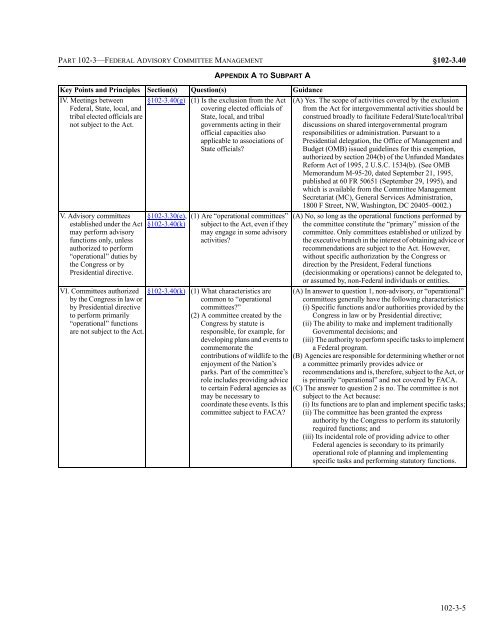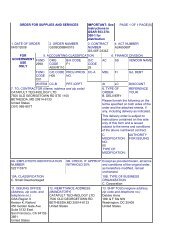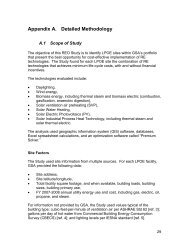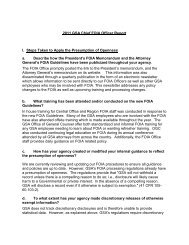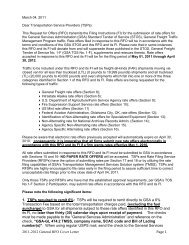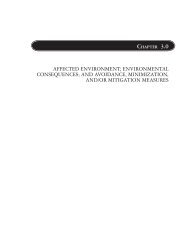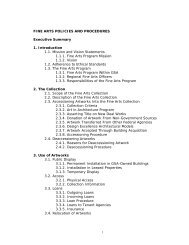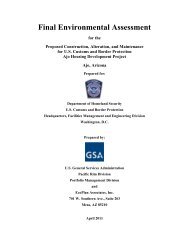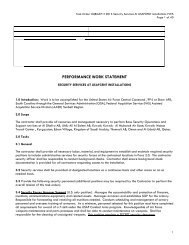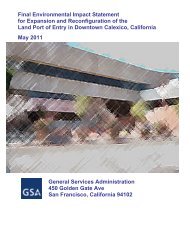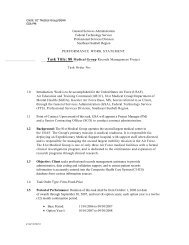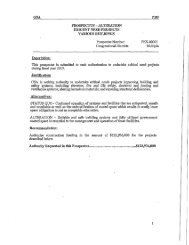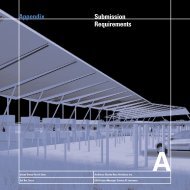- Page 1: CHAPTER 102 FEDERAL MANAGEMENT REGU
- Page 4 and 5: AMENDMENT 2005-02 JANUARY 19, 2005
- Page 6 and 7: This page intentionally left blank.
- Page 8 and 9: FEDERAL MANAGEMENT REGULATION This
- Page 10 and 11: FEDERAL MANAGEMENT REGULATION This
- Page 12 and 13: §102-2.45 FEDERAL MANAGEMENT REGUL
- Page 14 and 15: §102-2.145 FEDERAL MANAGEMENT REGU
- Page 16 and 17: FEDERAL MANAGEMENT REGULATION This
- Page 18 and 19: §102-3.30 FEDERAL MANAGEMENT REGUL
- Page 22 and 23: §102-3.45 FEDERAL MANAGEMENT REGUL
- Page 24 and 25: §102-3.85 FEDERAL MANAGEMENT REGUL
- Page 26 and 27: §102-3.90 FEDERAL MANAGEMENT REGUL
- Page 28 and 29: §102-3.130 FEDERAL MANAGEMENT REGU
- Page 30 and 31: §102-3.130 FEDERAL MANAGEMENT REGU
- Page 32 and 33: §102-3.135 FEDERAL MANAGEMENT REGU
- Page 34 and 35: §102-3.175 FEDERAL MANAGEMENT REGU
- Page 36 and 37: §102-3.175 FEDERAL MANAGEMENT REGU
- Page 38 and 39: §102-3.180 FEDERAL MANAGEMENT REGU
- Page 40 and 41: FEDERAL MANAGEMENT REGULATION This
- Page 42 and 43: FEDERAL MANAGEMENT REGULATION This
- Page 44 and 45: FEDERAL MANAGEMENT REGULATION This
- Page 46 and 47: §102-5.35 FEDERAL MANAGEMENT REGUL
- Page 48 and 49: §102-5.120 FEDERAL MANAGEMENT REGU
- Page 50 and 51: This page intentionally left blank.
- Page 52 and 53: FEDERAL MANAGEMENT REGULATION This
- Page 54 and 55: FEDERAL MANAGEMENT REGULATION This
- Page 56 and 57: Training 102-33.175— What standar
- Page 58 and 59: FEDERAL MANAGEMENT REGULATION This
- Page 60 and 61: §102-33.20 FEDERAL MANAGEMENT REGU
- Page 62 and 63: §102-33.25 FEDERAL MANAGEMENT REGU
- Page 64 and 65: §102-33.50 FEDERAL MANAGEMENT REGU
- Page 66 and 67: §102-33.120 FEDERAL MANAGEMENT REG
- Page 68 and 69: §102-33.170 FEDERAL MANAGEMENT REG
- Page 70 and 71:
§102-33.195 FEDERAL MANAGEMENT REG
- Page 72 and 73:
§102-33.255 FEDERAL MANAGEMENT REG
- Page 74 and 75:
§102-33.330 FEDERAL MANAGEMENT REG
- Page 76 and 77:
§102-33.375 FEDERAL MANAGEMENT REG
- Page 78 and 79:
§102-33.425 FEDERAL MANAGEMENT REG
- Page 80 and 81:
AMENDMENT 2006-03 MAY 25, 2006 102-
- Page 82 and 83:
§102-34.20 FEDERAL MANAGEMENT REGU
- Page 84 and 85:
AMENDMENT 2006-03 MAY 25, 2006 §10
- Page 86 and 87:
AMENDMENT 2006-03 MAY 25, 2006 §10
- Page 88 and 89:
AMENDMENT 2006-03 MAY 25, 2006 §10
- Page 90 and 91:
AMENDMENT 2006-03 MAY 25, 2006 §10
- Page 92 and 93:
FEDERAL MANAGEMENT REGULATION This
- Page 94 and 95:
FEDERAL MANAGEMENT REGULATION This
- Page 96 and 97:
Cooperatives 102-36.180— Is there
- Page 98 and 99:
FEDERAL MANAGEMENT REGULATION This
- Page 100 and 101:
102-36-vi FEDERAL MANAGEMENT REGULA
- Page 102 and 103:
AMENDMENT 2006—06 OCTOBER 12, 200
- Page 104 and 105:
AMENDMENT 2006—06 OCTOBER 12, 200
- Page 106 and 107:
AMENDMENT 2006—06 OCTOBER 12, 200
- Page 108 and 109:
AMENDMENT 2006—06 OCTOBER 12, 200
- Page 110 and 111:
§102-36.245 FEDERAL MANAGEMENT REG
- Page 112 and 113:
AMENDMENT 2006—06 OCTOBER 12, 200
- Page 114 and 115:
AMENDMENT 2006—06 OCTOBER 12, 200
- Page 116 and 117:
AMENDMENT 2006—06 OCTOBER 12, 200
- Page 118 and 119:
Justifying Special Transfer Request
- Page 120 and 121:
Appendix B—Elements of a State Pl
- Page 122 and 123:
§102-37.35 FEDERAL MANAGEMENT REGU
- Page 124 and 125:
AMENDMENT 2006-02 MAY 25, 2006 §10
- Page 126 and 127:
AMENDMENT 2006-02 MAY 25, 2006 §10
- Page 128 and 129:
§102-37.240 FEDERAL MANAGEMENT REG
- Page 130 and 131:
AMENDMENT 2006-02 MAY 25, 2006 §10
- Page 132 and 133:
AMENDMENT 2006-02 MAY 25, 2006 §10
- Page 134 and 135:
AMENDMENT 2006-02 MAY 25, 2006 §10
- Page 136 and 137:
§102-37.475 FEDERAL MANAGEMENT REG
- Page 138 and 139:
AMENDMENT 2006-02 MAY 25, 2006 §10
- Page 140 and 141:
FEDERAL MANAGEMENT REGULATION This
- Page 142 and 143:
Appendix B FEDERAL MANAGEMENT REGUL
- Page 144 and 145:
FEDERAL MANAGEMENT REGULATION This
- Page 146 and 147:
AMENDMENT 2006-02 MAY 25, 2006 Appe
- Page 148 and 149:
FEDERAL MANAGEMENT REGULATION This
- Page 150 and 151:
102-38.240— What happens to the d
- Page 152 and 153:
§102-38.45 FEDERAL MANAGEMENT REGU
- Page 154 and 155:
§102-38.120 FEDERAL MANAGEMENT REG
- Page 156 and 157:
§102-38.225 FEDERAL MANAGEMENT REG
- Page 158 and 159:
§102-38.325 FEDERAL MANAGEMENT REG
- Page 160 and 161:
FEDERAL MANAGEMENT REGULATION This
- Page 162 and 163:
AMENDMENT 2006-01 MAY 24, 2006 §10
- Page 164 and 165:
FEDERAL MANAGEMENT REGULATION This
- Page 166 and 167:
FEDERAL MANAGEMENT REGULATION This
- Page 168 and 169:
AMENDMENT 2006-05 JULY 21, 2006 102
- Page 170 and 171:
AMENDMENT 2006-05 JULY 21, 2006 §1
- Page 172 and 173:
AMENDMENT 2006-05 JULY 21, 2006 §1
- Page 174 and 175:
AMENDMENT 2006-05 JULY 21, 2006 §1
- Page 176 and 177:
FEDERAL MANAGEMENT REGULATION This
- Page 178 and 179:
FEDERAL MANAGEMENT REGULATION This
- Page 180 and 181:
AMENDMENT 2006-04 JUNE 19, 2006 §1
- Page 182 and 183:
AMENDMENT 2006-04 JUNE 19, 2006 §1
- Page 184 and 185:
FEDERAL MANAGEMENT REGULATION This
- Page 186 and 187:
This page intentionally left blank.
- Page 188 and 189:
FEDERAL MANAGEMENT REGULATION This
- Page 190 and 191:
AMENDMENT 2005-03 NOVEMBER 8, 2005
- Page 192 and 193:
AMENDMENT 2005-03 NOVEMBER 8, 2005
- Page 194 and 195:
FEDERAL MANAGEMENT REGULATION This
- Page 196 and 197:
AMENDMENT 2005-03 NOVEMBER 8, 2005
- Page 198 and 199:
FEDERAL MANAGEMENT REGULATION This
- Page 200 and 201:
AMENDMENT 2005-03 NOVEMBER 8, 2005
- Page 202 and 203:
AMENDMENT 2005-03 NOVEMBER 8, 2005
- Page 204 and 205:
AMENDMENT 2005-03 NOVEMBER 8, 2005
- Page 206 and 207:
AMENDMENT 2005-03 NOVEMBER 8, 2005
- Page 208 and 209:
AMENDMENT 2005-03 NOVEMBER 8, 2005
- Page 210 and 211:
FEDERAL MANAGEMENT REGULATION This
- Page 212 and 213:
AMENDMENT 2005-03 NOVEMBER 8, 2005
- Page 214 and 215:
AMENDMENT 2005-03 NOVEMBER 8, 2005
- Page 216 and 217:
AMENDMENT 2005-03 NOVEMBER 8, 2005
- Page 218 and 219:
AMENDMENT 2005-03 NOVEMBER 8, 2005
- Page 220 and 221:
AMENDMENT 2005-03 NOVEMBER 8, 2005
- Page 222 and 223:
AMENDMENT 2005-03 NOVEMBER 8, 2005
- Page 224 and 225:
AMENDMENT 2005-03 NOVEMBER 8, 2005
- Page 226 and 227:
AMENDMENT 2005-03 NOVEMBER 8, 2005
- Page 228 and 229:
AMENDMENT 2005-03 NOVEMBER 8, 2005
- Page 230 and 231:
AMENDMENT 2005-03 NOVEMBER 8, 2005
- Page 232 and 233:
AMENDMENT 2005-03 NOVEMBER 8, 2005
- Page 234 and 235:
AMENDMENT 2005-03 NOVEMBER 8, 2005
- Page 236 and 237:
AMENDMENT 2005-03 NOVEMBER 8, 2005
- Page 238 and 239:
AMENDMENT 2005-03 NOVEMBER 8, 2005
- Page 240 and 241:
AMENDMENT 2005-03 NOVEMBER 8, 2005
- Page 242 and 243:
AMENDMENT 2005-03 NOVEMBER 8, 2005
- Page 244 and 245:
AMENDMENT 2005-03 NOVEMBER 8, 2005
- Page 246 and 247:
AMENDMENT 2005-03 NOVEMBER 8, 2005
- Page 248 and 249:
AMENDMENT 2005-03 NOVEMBER 8, 2005
- Page 250 and 251:
AMENDMENT 2005-03 NOVEMBER 8, 2005
- Page 252 and 253:
AMENDMENT 2005-03 NOVEMBER 8, 2005
- Page 254 and 255:
AMENDMENT 2005-03 NOVEMBER 8, 2005
- Page 256 and 257:
AMENDMENT 2005-03 NOVEMBER 8, 2005
- Page 258 and 259:
AMENDMENT 2005-03 NOVEMBER 8, 2005
- Page 260 and 261:
AMENDMENT 2005-03 NOVEMBER 8, 2005
- Page 262 and 263:
AMENDMENT 2005-03 NOVEMBER 8, 2005
- Page 264 and 265:
AMENDMENT 2005-03 NOVEMBER 8, 2005
- Page 266 and 267:
AMENDMENT 2005-03 NOVEMBER 8, 2005
- Page 268 and 269:
AMENDMENT 2005-03 NOVEMBER 8, 2005
- Page 270 and 271:
AMENDMENT 2005-03 NOVEMBER 8, 2005
- Page 272 and 273:
AMENDMENT 2005-03 NOVEMBER 8, 2005
- Page 274 and 275:
AMENDMENT 2005-03 NOVEMBER 8, 2005
- Page 276 and 277:
AMENDMENT 2005-03 NOVEMBER 8, 2005
- Page 278 and 279:
AMENDMENT 2005-03 NOVEMBER 8, 2005
- Page 280 and 281:
AMENDMENT 2005-03 NOVEMBER 8, 2005
- Page 282 and 283:
AMENDMENT 2005-03 NOVEMBER 8, 2005
- Page 284 and 285:
FEDERAL MANAGEMENT REGULATION This
- Page 286 and 287:
FEDERAL MANAGEMENT REGULATION This
- Page 288 and 289:
AMENDMENT 2005-03 SEPTEMBER 6, 2006
- Page 290 and 291:
§102-76.95 FEDERAL MANAGEMENT REGU
- Page 292 and 293:
FEDERAL MANAGEMENT REGULATION This
- Page 294 and 295:
FEDERAL MANAGEMENT REGULATION This
- Page 296 and 297:
FEDERAL MANAGEMENT REGULATION This
- Page 298 and 299:
AMENDMENT 2005-03 NOVEMBER 8, 2005
- Page 300 and 301:
FEDERAL MANAGEMENT REGULATION This
- Page 302 and 303:
AMENDMENT 2005-03 NOVEMBER 8, 2005
- Page 304 and 305:
AMENDMENT 2005-03 NOVEMBER 8, 2005
- Page 306 and 307:
AMENDMENT 2005-03 NOVEMBER 8, 2005
- Page 308 and 309:
AMENDMENT 2005-03 NOVEMBER 8, 2005
- Page 310 and 311:
AMENDMENT 2005-03 NOVEMBER 8, 2005
- Page 312 and 313:
FEDERAL MANAGEMENT REGULATION This
- Page 314 and 315:
FEDERAL MANAGEMENT REGULATION This
- Page 316 and 317:
FEDERAL MANAGEMENT REGULATION This
- Page 318 and 319:
FEDERAL MANAGEMENT REGULATION This
- Page 320 and 321:
FEDERAL MANAGEMENT REGULATION This
- Page 322 and 323:
FEDERAL MANAGEMENT REGULATION This
- Page 324 and 325:
AMENDMENT 2005-03 NOVEMBER 8, 2005
- Page 326 and 327:
AMENDMENT 2005-03 NOVEMBER 8, 2005
- Page 328 and 329:
AMENDMENT 2005-03 NOVEMBER 8, 2005
- Page 330 and 331:
FEDERAL MANAGEMENT REGULATION This
- Page 332 and 333:
§102-84.45 FEDERAL MANAGEMENT REGU
- Page 334 and 335:
This page intentionally left blank.
- Page 336 and 337:
FEDERAL MANAGEMENT REGULATION This
- Page 338 and 339:
102-117.240— What is my agency’
- Page 340 and 341:
§102-117.30 FEDERAL MANAGEMENT REG
- Page 342 and 343:
AMENDMENT 2004-02 SEPTEMBER 24, 200
- Page 344 and 345:
AMENDMENT 2004-02 SEPTEMBER 24, 200
- Page 346 and 347:
§102-117.235 FEDERAL MANAGEMENT RE
- Page 348 and 349:
§102-117.300 FEDERAL MANAGEMENT RE
- Page 350 and 351:
FEDERAL MANAGEMENT REGULATION This
- Page 352 and 353:
AMENDMENT 2004-02 SEPTEMBER 24, 200
- Page 354 and 355:
102-118.570— If my agency denies
- Page 356 and 357:
§102-118.35 FEDERAL MANAGEMENT REG
- Page 358 and 359:
AMENDMENT 2004-02 SEPTEMBER 24, 200
- Page 360 and 361:
AMENDMENT 2004-02 SEPTEMBER 24, 200
- Page 362 and 363:
AMENDMENT 2004-02 SEPTEMBER 24, 200
- Page 364 and 365:
AMENDMENT 2004-02 SEPTEMBER 24, 200
- Page 366 and 367:
§102-118.370 FEDERAL MANAGEMENT RE
- Page 368 and 369:
§102-118.450 FEDERAL MANAGEMENT RE
- Page 370 and 371:
AMENDMENT 2004-02 SEPTEMBER 24, 200
- Page 372 and 373:
AMENDMENT 2004-02 SEPTEMBER 24, 200
- Page 374 and 375:
§102-118.675 FEDERAL MANAGEMENT RE
- Page 376 and 377:
This page intentionally left blank.
- Page 378 and 379:
FEDERAL MANAGEMENT REGULATION This
- Page 380 and 381:
This page intentionally left blank.
- Page 382 and 383:
FEDERAL MANAGEMENT REGULATION This
- Page 384 and 385:
FEDERAL MANAGEMENT REGULATION This
- Page 386 and 387:
FEDERAL MANAGEMENT REGULATION This
- Page 388 and 389:
§102-173.45 FEDERAL MANAGEMENT REG
- Page 390 and 391:
FEDERAL MANAGEMENT REGULATION This
- Page 392 and 393:
This page intentionally left blank.
- Page 394 and 395:
FEDERAL MANAGEMENT REGULATION This
- Page 396 and 397:
FEDERAL MANAGEMENT REGULATION This
- Page 398 and 399:
§102-192.40 FEDERAL MANAGEMENT REG
- Page 400 and 401:
§102-192.105 FEDERAL MANAGEMENT RE
- Page 402 and 403:
§102-192.150 FEDERAL MANAGEMENT RE
- Page 404 and 405:
FEDERAL MANAGEMENT REGULATION This
- Page 406 and 407:
Appendix B must be accurately kept,
- Page 408 and 409:
FEDERAL MANAGEMENT REGULATION This
- Page 410 and 411:
§102-193.25 FEDERAL MANAGEMENT REG
- Page 412 and 413:
FEDERAL MANAGEMENT REGULATION This
- Page 414 and 415:
§102-194.35 FEDERAL MANAGEMENT REG
- Page 416 and 417:
FEDERAL MANAGEMENT REGULATION THIS
- Page 418:
FEDERAL MANAGEMENT REGULATION This


